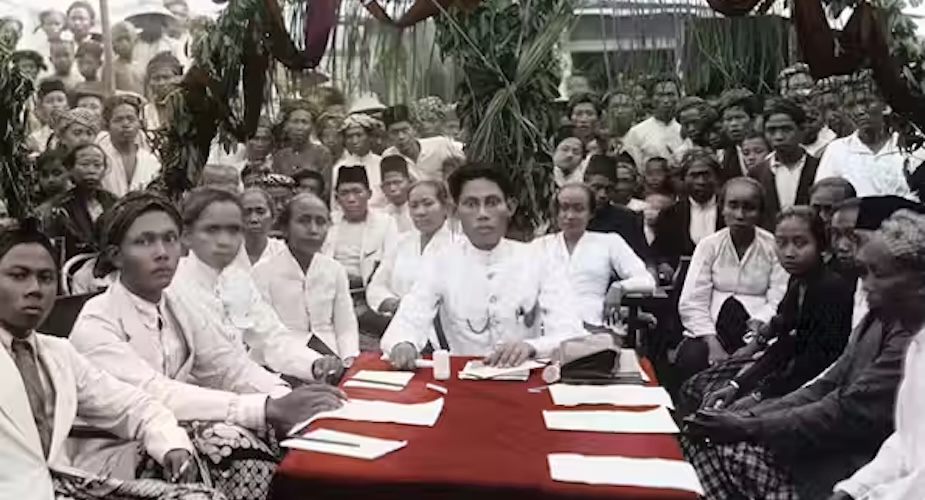Who cares that Indonesia's indigenous peoples are losing their land? The International Labour Organisation does, more than almost anyone else in the world, says TOM ETTY.
Who cares that Indonesia's indigenous peoples are losing their land? The International Labour Organisation does, more than almost anyone else in the world, says TOM ETTY.
The only international instruments specifically addressing indigenous and tribal peoples' rights are two conventions of the International Labour Organisation (ILO). Convention No. 107 concerns the 'Protection and Integration of Indigenous and Other Tribal and Semi-Tribal Populations in Independent Countries'. It was adopted by the International Labour Conference in 1957 and came into force two years later, when it had received the required minimum number of ratifications. Convention No. 169 concerning 'Indigenous and Tribal Peoples in Independent Countries' is a revision of Convention No. 107. It was adopted in 1989 and came into force in 1991.
Convention 107 has been ratified by 27 countries. Convention 169, which was designed because the ILO felt that this figure was a bit disappointing, has acquired 7 ratifications to date. Violations of the rights of indigenous peoples have been discussed frequently and in great detail by the Conference Committee on the Application of Ratified Conventions.
No direct access
It should be noted here that the supervisory procedure of the ILO is only accessible by the constituents of the ILO, i.e. by governments, employers' organisations and trade unions. The indigenous peoples themselves, or national and international non- governmental organisations (NGOs) representing their interests, do not have direct access. The ILO has involved them in the preparation of the two conventions mentioned (in particular Convention 169). And the secretariat of the ILO, the International Labour Office, maintains contact with them. But the peoples concerned, and their representatives and sympathisers, consider this a highly unsatisfactory situation.
The government of Indonesia has ratified neither Convention 107 nor Convention 169. As far as I have been able to find out, they have hardly shown interest in the work which led to the preparation and adoption of these instruments by the ILO. There is no indication that they are keen to become a party to the revised Convention (No. 169).
That is a great pity, as there are many indigenous peoples living in the Indonesian archipelago who could greatly benefit from the protection it offers. It seems, however, that the government of Indonesia does not want to recognise them as peoples as defined by the ILO.
Paradox
Here we have an interesting paradox. The Indonesian government has regularly expressed the view that ILO standards do not sufficiently take into account the special problems of developing countries, and that many of these standards derive from Western or industrialised countries' values. Now, although several of the latter do have indigenous peoples within their boundaries, the majority of countries which are familiar with the questions addressed in these ILO conventions are developing countries - and they had a strong input in them.
In short: the criticism against the allegedly Western-inspired universal character of ILO standards is to a very high degree unjustified, but in this particular case it would be absolutely pointless. One can even maintain that certain values which the government of Indonesia stresses so often (like consensus building) figure prominently in these conventions, and that the procedural character of most provisions offer ample room and flexibility for measures optimally adapted to local realities.
Interesting
However, the lack of interest displayed by Indonesia does not necessarily mean that the ILO conventions on indigenous peoples' rights are not interesting for these peoples in the country, for NGOs in and outside Indonesia advocating their interests, and for intergovernmental institutions with activities in Indonesia.
The value of the Indigenous Peoples Conventions will probably only become clear to a wider audience if and when the United Nations adopt their long abided Declaration on the Rights of Indigenous Peoples (in the year 2004, as is hoped and expected). That Declaration will probably show a high degree of indebtedness to the ground-breaking work of the ILO, not only in traditional ILO-fields like conditions of employment, vocational training, and social security and health, but also and in particular with regard to land rights.
Indonesia
Indonesia has ratified ten ILO Conventions, most of them of a 'technical' nature, i.e. dealing with concrete working conditions. Among the ten are two so-called 'human rights conventions': No. 29 on Forced Labour, and No. 98 on the Right to Organise and Collective Bargaining. The Forced Labour Convention is relevant to indigenous peoples.
Without ratification, the indigenous peoples in Indonesia cannot benefit from the provisions of the ILO conventions. The government does not have any obligation whatsoever. That does not mean, though, that the conventions, and in particular Convention 169, are irrelevant.
Rights
First, it is important for those directly concerned to know which, according to a large and important intergovernmental organisation, are their legitimate rights. As concerns land the ILO says among others that the rights of ownership and possession of these peoples over the lands which they traditionally occupy shall be recognised.
Their rights to the natural resources pertaining to their lands shall be specially safeguarded, and these rights include the right to participate in the use, management and conservation of these resources. Governments' rights to explore or exploit these resources are qualified by provisions for consultations, for participation in the benefits, and for fair compensation for damages resulting from such activities.
Also, the powers of governments to remove indigenous peoples from their lands are qualified by similar rules and by a right to return 'whenever possible'. The Convention obliges governments to consult indigenous peoples on several vital issues, and to establish means by which they can freely participate at all levels of decision making in bodies responsible for policies and programmes concerning them. Most important, it spells out that the consultations shall be undertaken 'in good faith and in a form appropriate to the circumstances, with the objective of achieving agreement or consent to the proposed measures'.
These elements are cornerstones for any set of requests, demands or claims of indigenous peoples in Indonesia to their government. They are important points of orientation in international forums whenever they think that their rights are violated by the government of Indonesia.
Pressure
Indigenous peoples in Indonesia, and Indonesian NGOs that want to engage in advocacy for their interests, may use the key elements of the conventions in efforts to put pressure on the government to create certain machinery, for instance for meaningful consultation, in line with the provisions of the convention, even though the government has no intention to ratify.
Of course, it is a mere illusion that the government would be open to such suggestions without any additional political pressure. But whenever conditions develop in such a way that it must take concrete steps to give some satisfaction to inside and/or outside pressure and find solutions, the points designed by the ILO might prove useful and constructive. The parties concerned could draw the attention of the National Commission for Human Rights of Indonesia to the provisions of the ILO instrument.
For non-Indonesian NGOs that want to contribute to the protection of the rights of indigenous peoples in Indonesia, ILO Convention 169 offers some interesting opportunities too. For instance, they may try to induce their own governments to ratify the Convention, so as to give it a broad international basis. In this connection it should be noted that a number of industrial countries in Europe, with and without indigenous peoples, have decided or are presently considering to become a party to the Convention.
These governments might also feel committed to stimulate and financially support ILO work concerning indigenous peoples. Such work could among others take the form of technical assistance provided by the International Labour Office to governments of developing countries that are interested, in principle, to adopt the ILO standards but think they cannot cope with the financial implications. Knowledge that such assistance is available may, in turn, be helpful to peoples and NGOs in Indonesia in their discussions with the government.
Trade unions
A final word, in this context, about the trade unions in all this. Unfortunately, the Indonesian trade unions belong to those who are not so free and independent of their government as real tripartism would require. But after the restructuring effort of the 'official' trade union corporation SPSI and the establishment of sectoral unions each within its field, they are compelled now to show to the international trade union movement that they are heading towards more autonomy.
This will not be an easy process, and it will require time. Some of these unions, organising agricultural and plantation workers, and wood and timber workers, cover sectors cutting through the world of life and work of indigenous peoples in Indonesia. The international federations to which these SPSI unions dearly want to affiliate should not fail to remind them of the Workers' Group input in the work which resulted in ILO Convention 169, and to tell them that they expect a clear commitment of a member organisation in Indonesia.
Ratification
The revised ILO Convention on Indigenous Peoples of the ILO (No. 169, of 1989) is an important instrument for the protection of indigenous peoples, including their land rights.
It is important that this Convention receive a much larger number of ratifications than the original Indigenous Peoples Convention (No. 107, of 1957). Massive ratification will make it difficult for governments of countries like Indonesia, which have many indigenous peoples within their boundaries but are very reluctant to see eye to eye with them, to maintain that attitude.
Ratification by Indonesia would considerably strengthen the position of indigenous peoples vis-a-vis the government, without bringing the government into a disadvantageous position. It would raise the prospects of finding constructive and sustainable solutions for problems which, sooner or later, will manifest themselves in forms which then will be even much more difficult to handle - if they can be handled at all.
Ratification is a precondition for proper ILO supervision of the application of the Convention in law and in practice by the government. Organisations committed to the cause of indigenous peoples should therefore lobby their governments to ratify Convention 169. This would be a major concrete contribution to the success of the current decade of the World's Indigenous Peoples. It would be a firm stone on the way to adoption by the UN General Assembly of a Declaration on the Rights of Indigenous Peoples by the end of the decade in 2004.
Aware
Indigenous peoples and NGOs advocating their interests should be made much better aware of the contents of the Convention and what it can mean for them. They could try various ways and means to convince the government to open certain procedures for consultations and participation in decision-making laid down in the Convention even before ratification.
The ILO and some of its industrialised member countries which have a special interest in the problems addressed by the Convention could be helpful in facilitating this by rendering technical assistance and if necessary help to provide the funds for this.
In order to defend and promote the interests of indigenous peoples more effectively, these peoples themselves and interested NGOs should seek much closer contacts and cooperation with the constituents of the ILO than today. Several trade unions have already expressed their interest in this.
Important as the work in the ILO Subcommission on Prevention of Discrimination and Protection of Minorities and in the UN Commission for Human Rights is for the indigenous peoples and NGOs, they would be well advised not to target exclusively these two bodies but also spend some energy on the promotion of better cooperation between them and the ILO.
Tom Etty is policy advisor for international affairs at the Dutch labour union FNV. This article is extracted from a paper made available at the INFID conference in Canberra.











